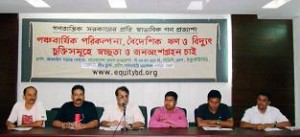Dhaka, 17th April 2010. Today Bangladesh National Committee on People’s SAARC, a coalition of civil society right groups announced three-day programs in a press conference held at Dhaka Reporters Unity. On the eve of the 16th SAARC Summit to be held in Bhutan on 28 and 29 April, this coalition outlined its three-day program that includes several people’s events to raise civil society voices to be herd in the official SAARC process. Through this press conference, this coalition demanded visa free South Asia for greater South Asian integration embedded with peace, harmony and well-being of the common people of the South Asian countries. They also criticized official SAARC process as it has failed to respond the common aspirations of the South Asian people. The press conference was chaired and moderated respectively by the committee convener Dr. Rashid E Mahbub and Rokeya Kabir, while Rezaul Karim Chowdhury read-out the written statement, Mohiuddin Ahmed spoken about the prospect of forming People Union of South Asia, especially in respect of eradicating poverty in using common natural resources.
People’ SAARC is a convergent of CSOs in South Asia since 2007. Along with the official SAARC Summit, the first people’s SAARC held in Nepal in 2007, second one was in Colombo in 2008 and, the next People’s SAARC, along with the 16th SAARC Summit, will be held in Delhi on 22 and 23rd of April 2010. Alongside, People’s SAARC Bangladesh committee will organize cultural program and youth rally on 18th April in Dhaka University campus, a seminar on 19th April at CIRDAP auditorium and finally, on the inauguration day of official SAARC summit on 28th April, a protest rally will be organized in front of national press club.
Rokeya Kabir explained the background on the formation of People’ SAARC which was South Asia wide process. Mohiuddin Ahmed mentioned that, South Asia has a vast of natural resources, which remain un-utilized for mistrust and conflict. Dr. Mahbub E Rashid criticized SAARC not to having any progress in regional integration in true sense, while other regions, especially South East Asia, have had much progress in this regard. In the written statement, M Rezaul Karim Chowdhury mentioned that the rulers of this region must head toward a society of human liberty rather then having a society of security; this is the only way to get rid of fundamentalism and terrorism of this sub continent. The statement mentioned still 500 millions South Asian live under $ 1 income and 88 millions people suffer from hungry, which is world largest. However, the SAARC has still failed to operationalize SAARC food bank. They criticized Bhutan government for creating refugee problem; they also criticized Bhutanese monarchy for limiting democracy and civil society development. They mentioned that South Asia will have worst climate impact, that without regional integration there is no way to tackle those, especially the drinking water, irrigation water and climate migrants problems.
The members of the coalition includes ACD, BNPS, EquityBD, IED, INCIDIN Bangladesh, SAAPE, SUPRO, Jubilee South-APMDD, SANGAT and Unnayan Anneshan. The press conference were also attended by Noman Ahmed Khan, Sahanaz Sumi, Omar Tarek Chowdhury, Sahadat Islam Chowdhury, Mostafa Kamal Akhanda and Atiqul Islam Chowdhury.
Please Download Press Release [Bangla] [English] [Positional paper]







